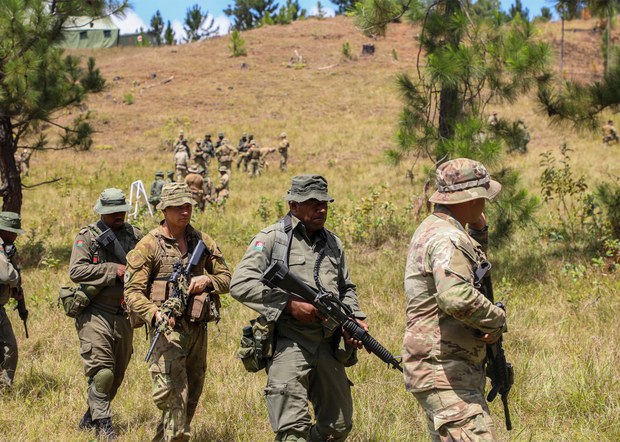US, Pacific allies conclude Exercise Cartwheel joint drills in Fiji
Share

Caption: U.S. Army Soldiers train alongside Republic of Fiji Military, Australian, New Zealand and British forces during Exercise Cartwheel 2022 in Fiji, Sept. 17, 2022.
UPDATED AT 10:20 P.M. EDT ON 9-23-2022
A multinational military training exercise involving the U.S., the U.K., Australia, New Zealand and Fiji concluded on Friday in the Pacific island nation. The 11-day Exercise Cartwheel 2022 drew criticism from China which has been seeking to expand influence in the South Pacific.
The exercise, named after Operation Cartwheel – a major military operation for the Allies in the Pacific during World War II – aimed at building “expeditionary readiness and interoperability”, according to a press release from the U.S. Embassy in Suva.
Around 270 troops from five nations took part in drills conducted in both jungle and urban environments.
The New Zealand Defense Force’s land component commander, Brigadier Hugh McAslan, told NZ media that Exercise Cartwheel provided a platform for participating forces to work together, building readiness for military action and other crises.
“We have an obligation to work alongside these folks… We are part of the Pacific,” McAslan was quoted as saying.
Chinese officials have yet to say anything about the conclusion of the exercise but China’s state media have made disparaging remarks over what they call “another of the U.S.’s important battlegrounds in its game with China.”
The hawkish Global Times said by conducting joint drills in Fiji, the U.S. wanted to send “a signal to China and regional countries in the South Pacific.”
The drills should be seen as “an effort to counter China’s influence in the region,” the newspaper said.
Influence battle
Song Zhongping, a Global Times’ regular commentator, was quoted as saying that the U.K., a country outside the region, “went all the way to the South Pacific to participate in the drills.”
“Britain is scheming to meddle in Asia-Pacific affairs… London has become one of U.S.’s most active allies, be it when targeting China or Russia,” Song was quoted as saying.
“The U.S. has mobilized its alliance system to suppress China,” the paper said, adding that “regional countries in the South Pacific are not satisfied with the U.S. for trying to turn the region into an anti-China battlefield.”
China and the Solomon Islands confirmed in April that they had signed a secretive security deal and, although details of the pact have not been made public, there are concerns that Beijing may be able to deploy security forces there in the future.
In recent years, China has been developing closer ties with countries in the South Pacific, wooing them with infrastructure loans and economic assistance, as well as military exchanges.
“Our assistance to island countries is sincere and results-oriented with no political strings attached,” said a Chinese Foreign Ministry spokesperson last week.
Beijing has not hidden its ambition to set up military bases in the region. In 2018, media reports about China’s plan to build a base in Vanuatu prompted a stern warning from then-Australian Prime Minister Malcolm Turnbull.
However, China failed to achieve a sweeping trade and security agreement – the China-Pacific Island Countries Common Development Vision – during Foreign Minister Wang Yi’s Pacific tour in May.
U.S. charm offensive
For its part, the U.S. in recent months has ramped up its efforts to engage with Pacific island nations, with top officials for the Indo-Pacific region actively traveling to the region and meeting with their Pacific counterparts.
Just last week Deputy Secretary of State Wendy Sherman met with a number of senior Pacific officials in Hawaii where she discussed deepening relationships with countries in the region.
In July, at the virtual Pacific Islands Forum leaders’ meeting, chaired by the Fijian Prime Minister, U.S. Vice President Kamala Harris announced a series of commitments to strengthen the U.S.-Pacific nations partnership, including the establishment of new U.S. embassies in Tonga and Kiribati, alongside the reopening of the Embassy in the Solomon Islands.
The U.S. government also pledged to triple the funding for the Forum Fisheries Agency to U.S. $60 million per year for the next ten years.
The State Department is close to renewing strategic partnership agreements, called “Compacts of Free Association”, or COFAs, with the three Pacific island nations of Palau, Micronesia and the Marshall Islands, according to Special Presidential Envoy Joseph Yun.
The COFAs, which were signed originally between the U.S. and the three Pacific island states during the 1980s and will soon expire, allow the U.S. to operate armed forces in the agreement areas as well as to deny foreign militaries access to those countries’ waters, airspace and land.
The first-ever U.S.-Pacific Island Country Summit will take place Sept. 28-29 in Washington, D.C., the White House said in a statement earlier this month.
CORRECTION: An earlier version used the wrong name to refer to the joint military exercise.







